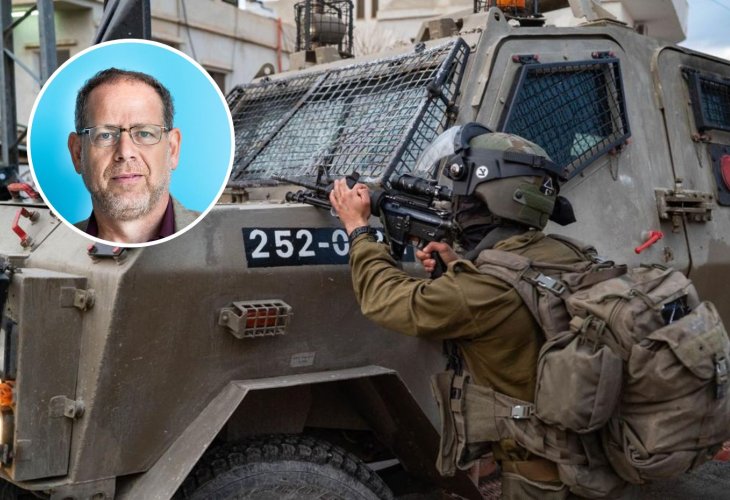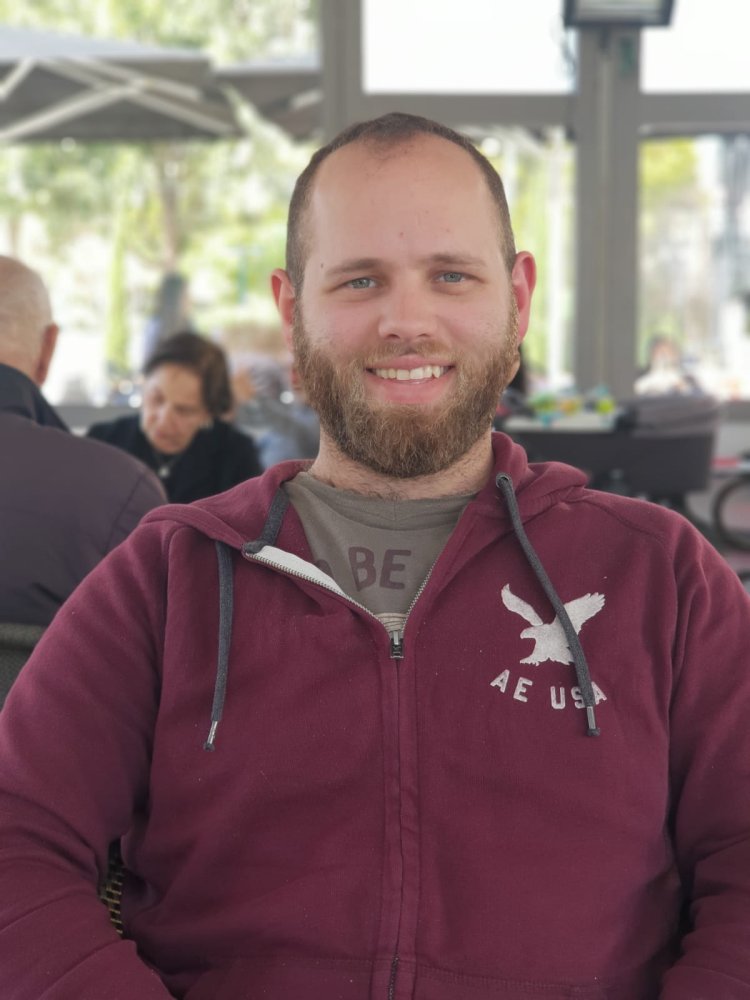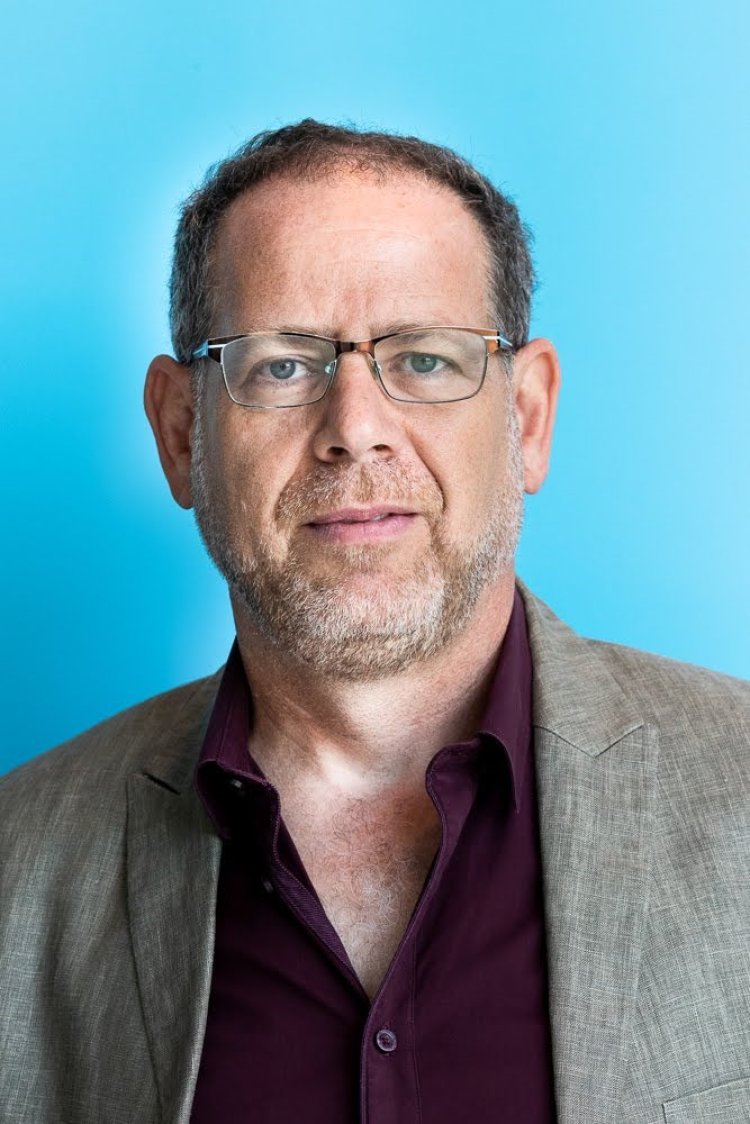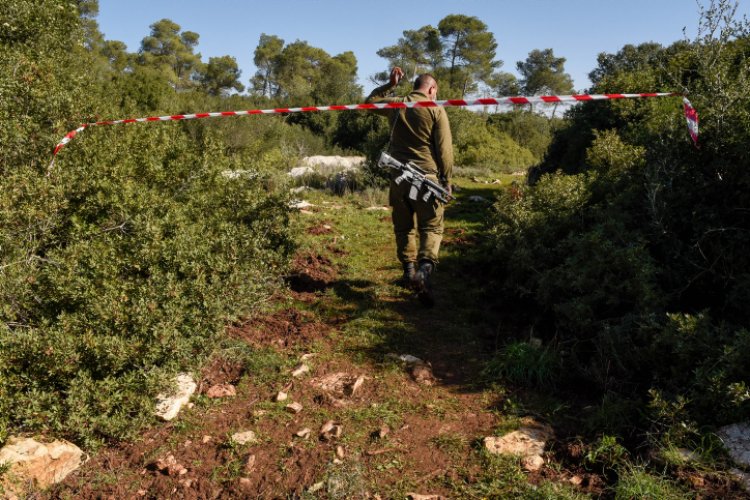Benjamin Horgan in a Chilling Interview: "I Never Thought Terror Would Strike Me Again"
After Benjamin Horgan lost his wife in a brutal terror attack near their home in Samaria, he remarried and began rebuilding his life. But then terror hit his family once more. In an interview with 'Hidabrut,' he discusses his second marriage and the double loss.
 (Illustrative photo: IDF Spokesperson. In the circle: Benjamin Horgan)
(Illustrative photo: IDF Spokesperson. In the circle: Benjamin Horgan)During one of the peak periods of the terror wave that swept through Israel before the Gaza border massacre, Meir Tamari, may his memory be blessed, was murdered in a shooting attack near his home. This tragic event took Benjamin Horgan, Tamari's stepfather-in-law, back to another terror attack in which his first wife, Esther, may her memory be blessed, was murdered. "Meir was married to my second wife's daughter," Horgan tells 'Hidabrut' in an interview. "The loss in such a horrifying manner is the second one I've experienced," he says with pain.
The initial information about the attack in which Tamari was murdered reached Horgan shortly after the incident, on the morning of the 10th of Sivan. "From what we were told," he recalls in a conversation with 'Hidabrut', "he was on his way home in the settlement of Hermesh during the attack. Meir was close to the entrance of the settlement when terrorists approached him in their car. This caused him to slow down, and they shot him before fleeing the scene."
Tamari, who was 32 at the time of his murder, left behind a wife and two young children, about one and three years old. He moved to live in Hermesh with his wife, a native of the area, and there he built his home with his own hands. In the last days of his life, Meir had just completed building the house but barely had time to enjoy it.
 Meir Tamari, of blessed memory (photo courtesy of the family)
Meir Tamari, of blessed memory (photo courtesy of the family)At what stage do you receive the notification about what happened?
"It happened on Sunday morning – shortly after the attack," he says. "I was at home then when suddenly I received a phone call from my wife's daughter, who said there was an attack at the entrance of the settlement where she lives and she fears Meir was involved in the incident."
"It wasn't just a fear," Horgan explains, "Moments before, Meir had updated her that he was arriving soon at the Hermesh settlement, and then the attack occurred at the entrance of the settlement. She didn't need much thought to estimate that he was at the attack scene, especially since he wasn't answering his phone afterwards. She's telling us all this, worried and concerned."
What do you do with this information?
"Immediately after we received the chilling call, my wife and I headed towards the Hermesh settlement," he says. "It might have been wise to hesitate due to the fact that an attack had just occurred there, but I estimated that if there was an attack there, security forces would already be present and secure the area, eliminating a security threat in visiting."
"When we arrived, it became clear that the army was not allowing entry. We waited near the ambulances and large forces present for many long minutes. Later, we were updated that he was evacuated to the Hillel Yaffe Hospital. In the first report we received, they said he was injured and conscious. This information gave us more than a spark of optimism regarding his condition; we believed at that time he would pull through."
Horgan made his way to the Hillel Yaffe hospital to find out about Meir's condition. "My wife stayed home with the children, and I hurried to the hospital with Meir's wife. When we arrived, we searched for him in the intensive care unit, but then a pair of doctors approached us. They asked us to enter one of the offices in the hospital and brought in the hospital's social worker to inform us of the most difficult news – Meir was murdered. May his memory be blessed."
 Benjamin Horgan
Benjamin Horgan
Terror Strikes Twice
The attack in which Tamari was murdered is, as mentioned, the second attack to strike Horgan's family. "I woke up that morning, as usual, and everything seemed ordinary," he returns to the previous attack in which his wife Esther, may her memory be blessed, was murdered. "I spoke with Esther in the morning hours of the murder day. It was a fairly routine conversation. In retrospect, I realize it was our last conversation."
Horgan immigrated as a teenager from France with his family. Esther, his future wife, immigrated to Israel as an 18-year-old girl. After several years, the couple married and built their home. They later moved to Tel Menashe.
The attack in which his wife was murdered shook Benjamin deeply. Some time later, he decided to consider marrying again. "Everyone knows the verse 'It is not good for man to be alone'," he quotes and adds, "I immediately saw that the words were true for me." And indeed, some time after the shocking murder, he remarried.
 Scene of the attack where Esther Horgan was murdered (Photo: Meir Vaknin, Flash 90)
Scene of the attack where Esther Horgan was murdered (Photo: Meir Vaknin, Flash 90)"The matchmaking began several months after Esther's murder," he recalls. "At that time, I received a painting by an artist of Esther. It turned out that behind the painting was a painter who was exposed to my late wife's story and decided to paint her and pass the picture to the family. In her efforts to deliver the picture to the family, she reached out to my close circle, and after a challenging journey, the painting reached me. From then on, under private providence, I remarried my new wife after the mourning year. I think Esther arranged this match from above," he says thoughtfully.
He adds: "Second marriages can be challenging, but if you do everything with great help from above, it can succeed."
As mentioned, his second wife's daughter was married to Meir Tamari, may his memory be blessed. "It was a complete shock," says Horgan, returning suddenly to the difficult notice he received with Tamari's wife at the hospital. "The widow is a young woman around 26, with two young children, with her whole life ahead of her. To the great sorrow, in an instant, she became a widow."
It can be assumed that Meir's murder brings you back to the attack where Esther was murdered?
"No doubt this painful message sends me back two years, to the moment I was informed of my wife's murder. Not only did the feelings return, but also the procedure and all the surrounding needs; it is a funeral, a shiva, notifying the grandparents, and the media that suddenly arrive and approach, and most importantly – supporting my wife, who lost her son-in-law. She is very close to her daughter's family. They lived with her for about two years, and she raised their children. I have already experienced a disaster up close, and I can participate and assist as much as possible."
Share with the readers about Meir's personality
"I had a close relationship with Meir; his children call me 'Grandpa', and I regarded him as a son. Meir was a wonderful and kind-hearted person. He grew up in a Chassidic family in Tzfat, with 9 siblings. In his life, he performed many good deeds. In his youth, he served in a special track in the IDF intelligence unit 8200 and was trained there as a senior electrician. He was responsible for all the facilities of the unit on the northern border. From what I understand, he pioneered a new path in the unit. After his wedding, he started a business and worked as an electrician."
What is the family going through now?
"The family is still trying to digest the tragic loss. The event is still relatively fresh. By now, they are dealing with it on a daily basis, effectively surviving it in part due to far-reaching displays of support and assistance from all of Israel, including several initiatives that aimed to help the widow financially, indeed lots of help arrived. In coping with the many challenges, my wife committed herself, spending a lot of time with her daughter, supporting and also helping care for the young children. Speaking of children, my children also now have to get used to the idea that someone familiar and very close was murdered in an attack. May we know no further sorrow."
Change in Military Policy
We spoke with Horgan even before the severe Simchat Torah events and the massacre committed by Hamas in the border settlements, but even then Horgan recognized the need for different management of the policy against terror. "In my opinion, the IDF is managing a policy of containment rather than initiative," he outlines the failure he believes led to the attack. "The problem now is that the attacks across Judea and Samaria have returned, and they are bloody and difficult. The attacks come from the cities of Jenin and Nablus, and you don't have to be a great strategist to understand that these places don't need to be treated with tweezers but with bulldozers. I'm personally not an expert, but I consulted experts – and it is impossible to entrust the Palestinian Authority, which I think is a terrorist organization in all respects, with responsibility in the field."
When Horgan talks about the Palestinian Authority, he is determined. "Although everything is from Heaven, yet I have proof that the incitement by the Authority indirectly led to the action of the terrorist who killed Esther. He admitted to investigators that he decided to go out and kill Jews as a reaction and revenge for the death of his friend in Israeli prison, whom he knew while himself imprisoned."
And what's the real story?
"The exact opposite of the incitement claim by the Palestinian Authority," Horgan declares passionately. "That friend sat in Israeli prison for four murders, serving four life sentences. At some point, he fell ill with cancer and, after receiving treatment far beyond what one would find in the medicine basket – and here I must say that some of these distortions, where terrorists receive especially improved conditions, have been corrected by the current government – he died of the disease. Yet, this death was presented by the Authority as a murder by the 'Zionist entity.' The Authority went further, claiming he underwent medical experiments and was denied medications, allegedly causing his death. The result was the murder committed by that vile terrorist."
Horgan notes that the terrorist who murdered his wife received a life sentence and an additional three years: "Additional years were imposed on the terrorist for another offense is he was convicted of – planning to shoot someone, and an additional two years of probation. Furthermore, the terrorist was ordered to pay compensation amounting to more than three million shekels. But I genuinely wonder if these penalties will prevent the next murder. The sentence he received was definitely expected, that's what's customary in Israel today. We accept it, and in that regard, I can say we weren't surprised," he says with a harsh tone.
"But we still have another demand from the government, and that's the need to reestablish manned checkpoints across Judea and Samaria. For example, the Hermesh checkpoint was manned until recently, but due to European countries' pressure – Israel removed many checkpoints in the area, including this one, to ease the Palestinians' lives. Who knows if that's what could have prevented Meir's murder.
"You must understand," stresses Horgan, "there was a failure before the attack: the Hermesh checkpoint located ten meters from the attack scene was unmanned. It was opened because a global campaign demands a semblance of life sharing between Israelis and Palestinians, and this convenience of not delaying them at the checkpoints is costing us lives. After the attack, the IDF manned the checkpoint for a week, but then the forces left the area. In response, residents of the settlement and other settlements voluntarily manned the abandoned checkpoint.
"Now I'm glad the brigade commander and the army have come to their senses, and following the residents' struggle, the checkpoint is back in operation," Horgan concludes on an optimistic note.

